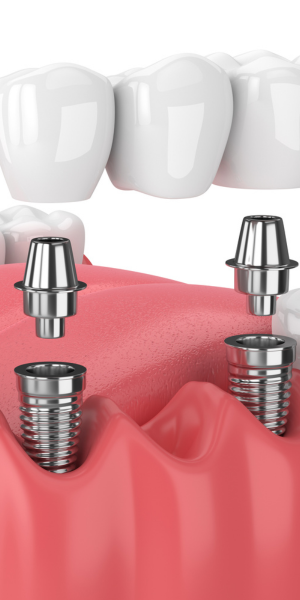19th September 2023
What Are The 3 Stages Of Dental Implants?
Introduction to Dental Implants
Dental implants have revolutionized the field of dentistry, providing a long-lasting solution for those with missing teeth. These artificial tooth roots are made of titanium and are surgically placed into the jawbone. If you are considering dental implants, it is important to understand the three essential phases involved in the process. This article will guide you through each phase, debunk common misconceptions, and emphasize the significance of the treatment.
The Importance of a Consultation Before Getting Dental Implants

Before embarking on your dental implant journey, it is imperative to have a consultation with a qualified dental professional. This initial meeting allows the dentist to evaluate your oral health, discuss your treatment goals, and determine if you are a suitable candidate for dental implants. During the consultation, the dentist will also address any concerns or questions you may have, ensuring that you are well-informed about the entire process.
A thorough examination of your mouth, teeth, and gums will be conducted to assess the condition of your oral health. The dentist will also review your medical history to identify any factors that may affect the success of the tooth implant procedure. Additionally, they may take X-rays or perform a CT scan to obtain a detailed image of your jawbone, helping them plan the placement of the dental implants accurately.
Phase 1: Booking and Having a Consultation
The first phase of the dental implant process involves booking and having a consultation with a dental professional. At Lion Dental Stourbridge, our team of experienced dentists is dedicated to providing exceptional care and personalized treatment plans. When you schedule your consultation, you will be greeted by our friendly staff and guided through the initial paperwork.
During the consultation, our dentist will take the time to understand your specific needs and expectations. They will thoroughly examine your mouth, checking the health of your gums and remaining teeth. This examination is crucial in determining if you are a suitable candidate for teeth implants.
In addition to the examination, our dentist will discuss the various treatment options available to you. They will explain the benefits of dental implants and address any concerns you may have. It is important to ask questions during this phase to ensure that you have a clear understanding of the process and what to expect.
Phase 2: Treatment Planning for Dental Implants – X-rays and CT Scans
Once you have had your consultation and it is determined that dental implants are the best solution for you, the next phase is treatment planning. This phase involves taking X-rays and CT scans to gather detailed information about your jawbone and surrounding structures. These images allow the dentist to accurately plan the placement of the dental implants and ensure optimal results.
X-rays provide a two-dimensional view of your teeth and jawbone, allowing the dentist to identify any potential issues such as bone loss or infection. CT scans, on the other hand, provide a three-dimensional image, offering a more comprehensive view of your oral structures. This helps the dentist visualize the density and quality of your jawbone, enabling them to determine the most suitable implant placement.
By utilizing advanced imaging technology, our team at Lion Dental Stourbridge can create a personalized treatment plan tailored to your specific needs. This ensures that dental implants are placed in the optimal position for stability and longevity.
Phase 3: Beginning the Dental Implant Process
After the treatment planning phase, you are ready to begin the dental implant treatment process. This phase involves the surgical placement of the dental implants into the jawbone. The procedure is typically performed under local anaesthesia to ensure your comfort throughout the process.
During the surgery, the dentist will make a small incision in the gum tissue to expose the jawbone. They will then create a small hole in the bone and carefully place the titanium implant. The gum tissue is then sutured back in place, allowing the implant to integrate with the jawbone over several months.
Once the implant has fully integrated with the jawbone, a process known as osseointegration, a crown, bridge, or denture can be attached to the implant. This restoration will blend seamlessly with your natural teeth, providing a functional and aesthetically pleasing result.
Dental Implant: Common Misconceptions
Despite their numerous benefits, dental implants are often surrounded by misconceptions. One common misconception is that dental implants are painful. In reality, the procedure is performed under anaesthesia, ensuring that you do not experience any discomfort during the surgery. Afterwards, any post-operative pain can be effectively managed with pain medication prescribed by your dentist.
Another misconception is that dental implants require extensive maintenance. Caring for dental implants is similar to caring for natural teeth. Regular brushing, flossing, and dental check-ups are essential to maintain the health and longevity of your implants.
Additionally, some people believe that dental implants are prohibitively expensive. While dental implants may require a larger upfront investment compared to other tooth replacement options, they are a long-lasting solution that can ultimately save you money in the long run by avoiding the need for frequent replacements or repairs.
In conclusion, dental implants are a reliable and durable solution for those with missing teeth. By understanding the three essential phases of the dental implant process and debunking common misconceptions, you can make an informed decision about your oral health. Remember to schedule a consultation with a qualified dental professional, such as the experts at Lion Dental Stourbridge, to begin your journey towards a confident and beautiful smile.
